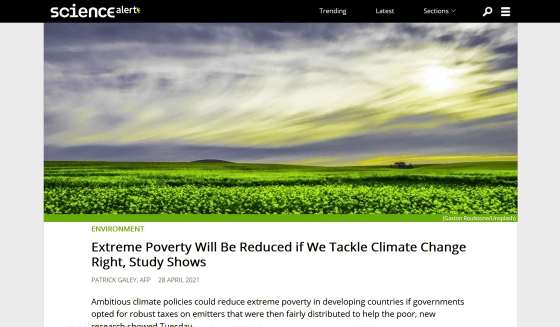Research shows that coping with climate change can help reduce poverty

While it is the poor who are particularly severely affected by climate change, some argue that climate change afflicts the poor as measures to prevent global warming increase living costs. This conflict forces people to choose between climate and poverty, but a new open access journal,
Combining ambitious climate policies with efforts to eradicate poverty | Nature Communications
https://www.nature.com/articles/s41467-021-22315-9
Fair climate policy could help reduce extreme poverty — Potsdam Institute for Climate Impact Research
https://www.pik-potsdam.de/en/news/latest-news/fair-climate-policy-could-help-reduce-extreme-poverty
Extreme Poverty Will Be Reduced if We Tackle Climate Change Right, Study Shows
https://www.sciencealert.com/fixing-the-climate-crisis-can-also-reduce-extreme-poverty-study-shows

People living in low-income countries are more likely to lose their homes in the disasters caused by climate change, and the impact of climate change on agriculture and fisheries threatens the lives of relatively poor people. On the other hand, 'If the subsidies for fossil fuels and fertilizers are cut off, energy prices and food prices will rise, and low-income people will be in further distress.' 'Cheap energy sources such as coal support electricity in developing countries. There is also a claim that there is a strong belief that climate change measures and poverty measures are alternatives.
Therefore, a research team at the Potsdam Institute for Climate Impact Research conducted a study using a computer model to predict 'how interventions in global warming affect global poverty levels.' As a result of simulation using a model, it was found that as of 2030, about 350 million people will suffer from 'extreme poverty' living on less than $ 1.9 a day (about 208 yen). In addition, it seems that this prediction does not include the adverse effects of the new coronavirus infection (COVID-19).
Next, as a result of implementing the climate policy aimed at 'keeping the global average temperature rise from before the Industrial Revolution to less than 1.5 degrees Celsius', which was targeted by the Paris Agreement, 50 million more people will fall into extreme poverty. There is also a prediction result that there is a possibility. 'Climate policy protects people from the effects of climate change, such as extreme weather events and crop failures, but these may lead to higher energy and food prices,' said Bjoern Soergel, lead author of the treatise. This could be an additional burden for the world's poor, who are already vulnerable to the effects of climate. '

However, the research team
The mechanism proposed by the research team combines the redistribution of households with high carbon emissions into households with low carbon emissions, as well as the international transfer of funds from high-income and low-income countries. According to the survey, only 5% of the carbon price paid by developed countries can sufficiently compensate for the increased burden on the poor, which is a side effect of climate change measures in sub-Saharan Africa.
Income is returned equally to all citizens, turning poor households, which generally have low carbon emissions, into net beneficiaries. 'This could turn the trade-off between climate change and poverty eradication into a synergistic effect,' said Soergel.

Related Posts:
in Note, Posted by log1h_ik







